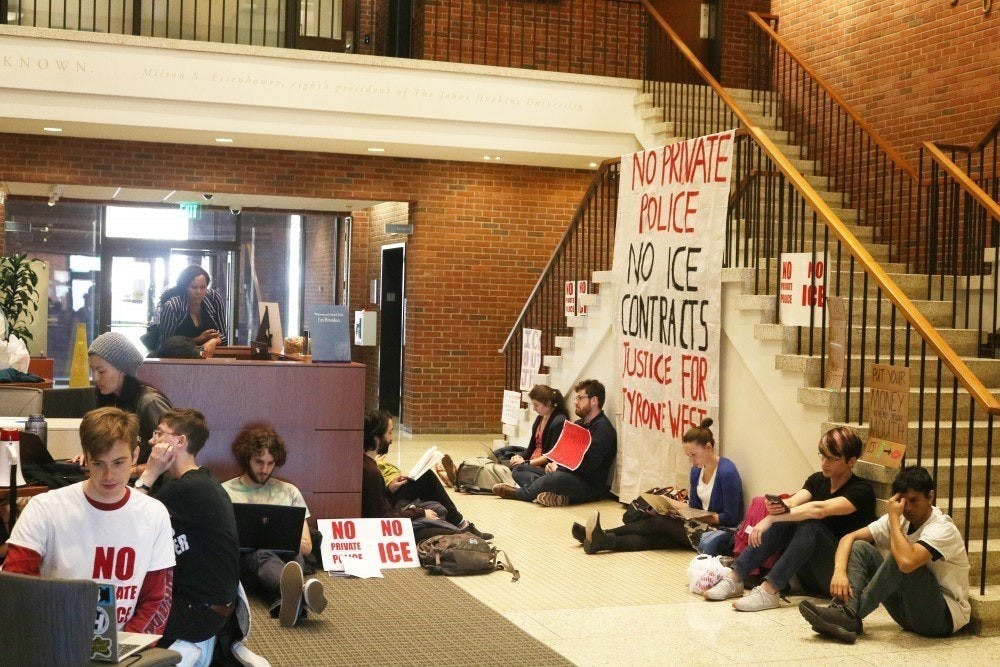The first time I visited Homewood Campus also happened to be the first night of the Garland Sit-In. Through all of the tours, class visits, events and students I spoke with during Spring Open House and Overnight Program (SOHOP), what I remember most is University President Ronald J. Daniels standing on stage, briefly addressing the protest that was taking place just across the quad. He was extremely dismissive of the protests, and it seemed to me that he did not care at all about what the students had to say. After one year at Hopkins, I have come to realize that this brief moment in Shriver Hall is emblematic of University leadership’s disregard for student voices.
On the evening of May 31, Daniels, along with other University and Hospital leaders, sent a message to the Hopkins community, claiming to stand in solidarity against racism and inequality. Beyond these messages of solidarity, the only other action Hopkins had taken thus far was covering the Hopkins sign on North Charles Street with tarps after it was graffitied with messages reading “BLM” and “NO JHUPD.”
Despite these claims of solidarity, Daniels and University leadership continue to plow forward with the creation of a private police force. For a University that sits in a city that faced, just five years ago, what is taking place now in major cities across the nation, the lack of true reflection on policing and its intersection with racism and injustice is telling. Their statement reflects how much this institution values black lives and the lives of Baltimore’s residents.
We claim to be a partner in the community, but what kind of partner continues forward with plans to create a private police force at a time when the violent and racist nature of American policing is on full display? Police departments across the country are showing their true colors in the face of peaceful protests, inciting violence and harming protesters who just want justice and change. Why do we think the Johns Hopkins Police Department (JHPD) will react any differently, especially partnered with Baltimore City Police, a department that is riddled with corruption and violence from top to bottom?
In the past week, as protests continue across the nation against policing practices, there have also been increasing calls for divestment from policing and investment in black communities. Hopkins, however, is choosing the opposite course of action by continuing forward with the JHPD. At a time of financial hardship, outlined weeks ago by Daniels himself, the University’s choice to push forward with this multi-million dollar effort is deeply disturbing. With major losses projected over the next year, is policing really where Hopkins should be spending its money?
Pursuing a private police force shows how little Hopkins is able to listen to its own students, faculty and community on issues of importance, and it proves the failure of this institution to recognize how deeply rooted in white supremacy policing is. The administration seems to be incapable of truly taking a step back and reflecting on how they themselves contribute to and deepen systems of oppression in Baltimore City, and they show no interest in actively working to do better in the future.
Now more than ever, it is apparent that the University must reverse course on the creation of a private police force on our campuses, and instead choose complete divestment from policing, including severing any ties with Baltimore City Police. Now more than ever, it is imperative that Hopkins students make sure that Daniels and the entire administration hears us loud and clear when we say that JHPD is not welcome on our campus.
The past few weeks, many have questioned how they can get more involved and deepen their commitment to anti-racism. One such way is ensuring that the JHPD never comes to fruition.
I have hope that we can stop the private police, building on and continuing the work of the Garland Sit-In. But, as Baltimore’s own DeRay Mckesson teaches us, hope requires work. Hopkins can and should divert the millions of dollars that will be spent on the private police to programs supporting BIPOC student communities on campus and to ensure that Hopkins is truly an inclusive environment for everyone. We all must put our hope to work and show Daniels that we won’t allow him to ignore our voices any longer.
Kevin LaMonica is a rising sophomore from Cleveland, Ohio majoring in Sociology and International Studies.





